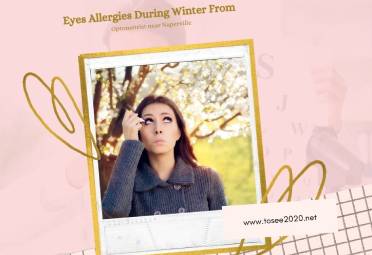Guide from Optometrist About Eye Allergies During Winter
Eye allergies, which are moreover recognized as allergic conjunctivitis, are unpleasant immune responses that take place when the eye gets in touch with annoying allergens. Diverse kinds of allergens possibly will include dust, pollen, or smoke. The immune system generally defends the body alongside harmful attackers like bacteria and viruses to defend against illnesses.

When it comes to people with eye allergies, the immune system occasionally mistakes an allergen for a hazardous substance. This can force the immune system to make chemicals that fight against the allergen, even though it is harmless. This reaction can cause several irritating symptoms, such as itchy, red, and watery eyes. Eye allergies possibly will moreover be linked to asthma and eczema in some individuals – says an eye expert in Naperville.
The majority of people don’t connect winter with allergies, but allergies persevere into and throughout the cold months. However, it’s imperative to identify that winter allergies do pose little different problems than they do throughout other seasons. Knowing how to stay away from them or minimize triggers can assist in keeping you feel your best all winter long.
Here is a Guide from Optometrist near Naperville, Il about eye allergies during winter:
There are two common types of eye allergies during winter:
1. Perennial Allergic Conjunctivitis (PAC)
2. Seasonal Allergic Conjunctivitis (SAC)
The major difference between these two common forms of visual allergy is their timing.
You have Perennial Allergic Conjunctivitis (PAC) if you:
• Have indications that last all over the year.
• You are concerned by indoor allergens like cockroaches, dust mites, and pet dander.
• Come to know that seasonal outdoor allergies aggravated your eye allergies if you are sensitive to them also.
How to cure PAC?
If you have PAC, you possibly will desire to regularly have appointments with your Eye Expert around Nap, Il to make sure that your eye allergies are being observed regularly. Irregular flare-ups will make it essential to keep your eye doctor in Naperville up to date with your ongoing condition. You possibly will also desire to consult an allergist (a doctor who specializes in allergic diseases, like allergic asthma and nasal allergies).
You have Seasonal Allergic Conjunctivitis (SAC) if you:
• Typically have symptoms for a short period.
• Are troubled by the spring tree pollen or in the summer by grass pollen or in the fall by weed pollen
• Normally have a period throughout the year where your symptoms entirely disappear – generally, this comes to pass in the winter.
How to cure SAC?
If you have SAC, you possibly will want to make an appointment with your optometrist earlier than the season when your eye allergies explode. In this way, you can begin some kind of cure or prevention program earlier than you start facing symptoms.

What is the cause of eye allergies in winter?
Eye allergies are caused by an unpleasant immune reaction to sure allergens in the air. Normally the immune system supports chemical changes in the body that assist in fighting off destructive invaders, for example, bacteria and viruses. But the immune system incorrectly identifies a nontoxic allergen as a dangerous burglar and starts fighting against it in people with eye allergies. Eye allergies are particularly common throughout the fall, spring, and winter months when plants are blooming. These reactions can moreover take place when a susceptible person comes into contact with an allergen and touches their eyes afterward. An optometrist near Naperville states that food allergies can also be the reason for eye allergy symptoms.
Symptoms of Eye Allergies:
• Blurred vision
• Burning sensation
• Mattering and/or mucous production
• Redness
• Swelling of the eye
• Tearing
Here Are Some Common Allergen Triggers for Eyes:
• Dust
• Grass
• Pollen
• Pet hair or dander
• Some medicines or cosmetics
• Weeds
Moreover, there are some elements that bother eyes but are not measured to be allergens, which are:
• Cigarette smoke
• Diesel Exhaust
• Perfume
When Should You Seek Medical Care?
A few people get that it is simple to identify the exact cause of their allergies and stay away from the triggers entirely (i.e. if allergic to pets, refraining from petting them, or keeping no pets yourself). However, if you are not capable to recognize the cause of your reactions, or simply cannot evade contact, you should visit a Naperville Optometrist.
